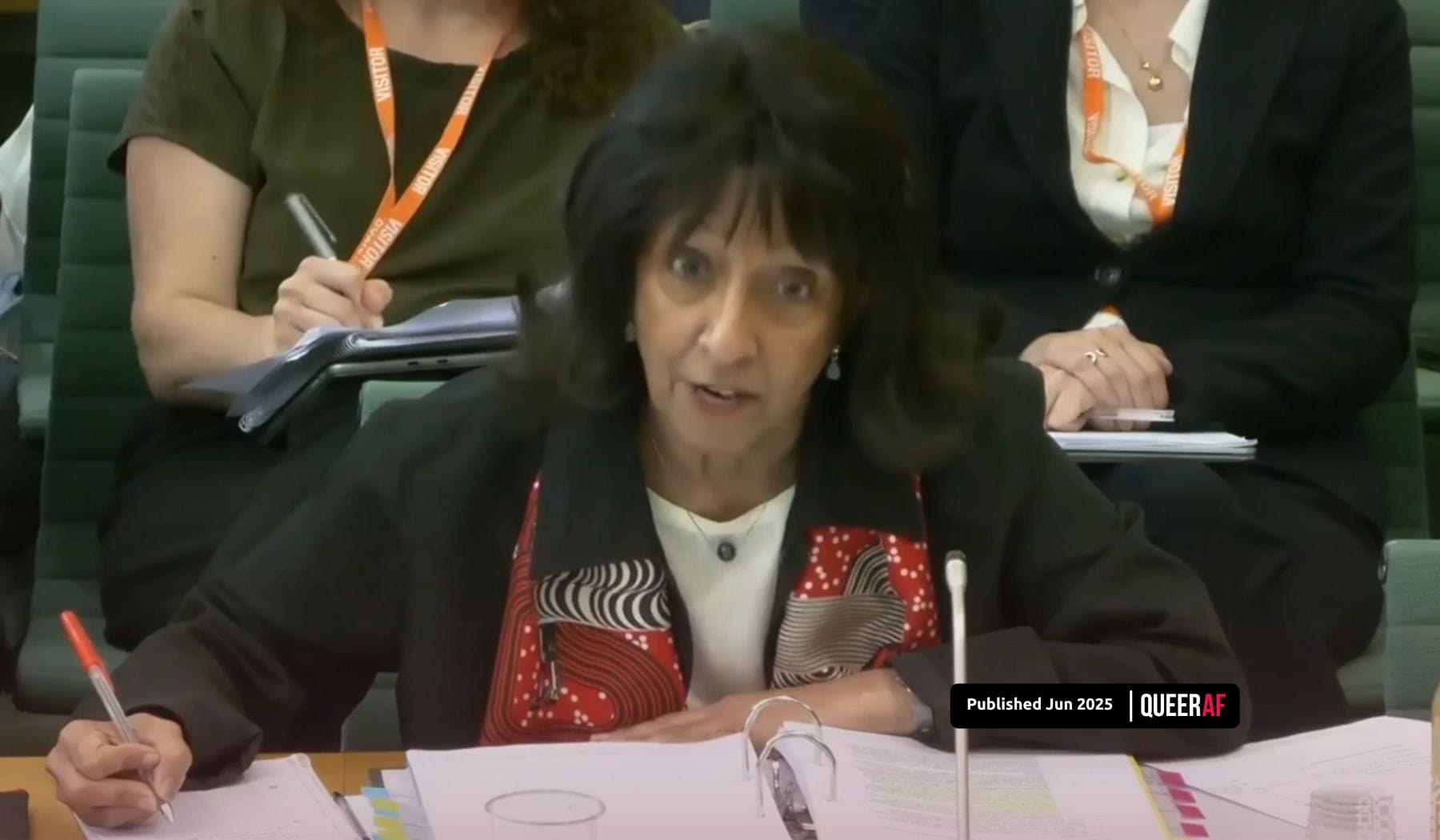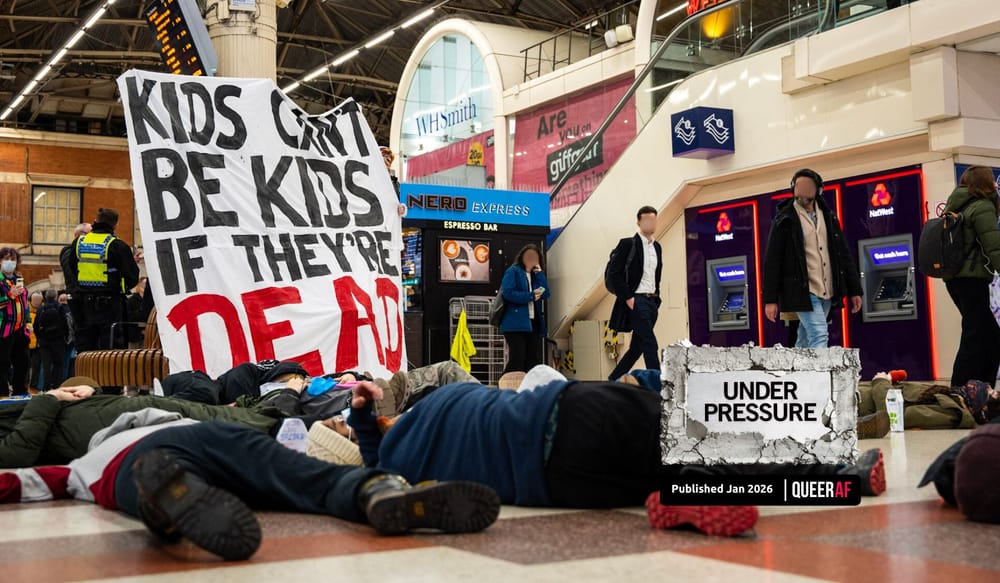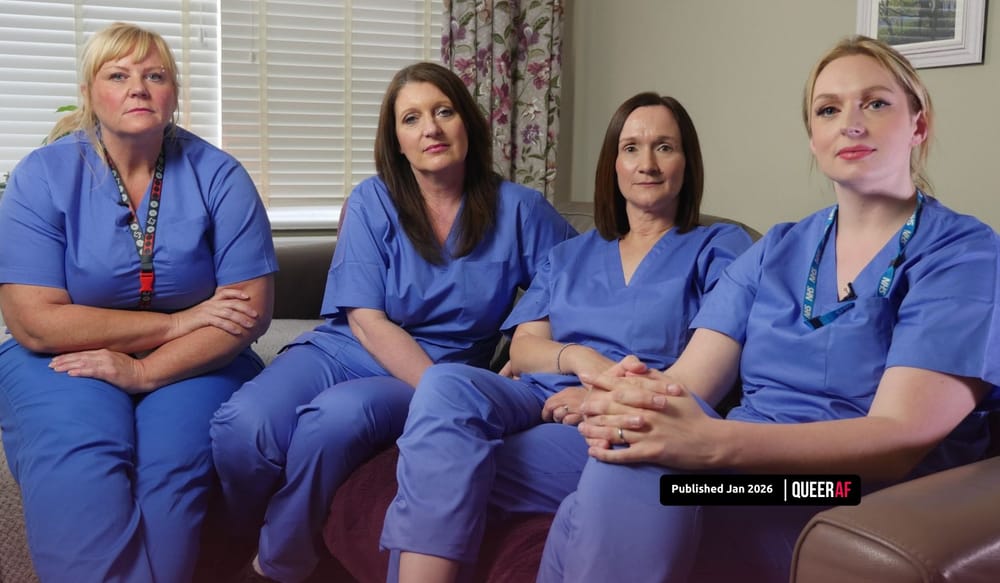TL;DR: In its annual scrutiny session at the parliamentary Women and Equalities Committee, the outgoing EHRC chair Baroness Krishwar argued that Article 8 of the European Convention of Human Rights didn’t apply to Trans+ people, just a day before Strasbourg affirmed it did.
In an annual scrutiny session, Equality and Human Rights Commission (EHRC) chair Baroness Falkner argued in parliament that Trans+ people didn't have the right to privacy under the European Convention of Human Rights.
Falkner was repeatedly questioned about MPs’ fears that the EHRC’s interim update and upcoming guidance - currently undergoing a shorter-than-usual consultation - could harm Trans+ people. She defended the plans, saying they don’t violate Article 8 of the Convention (the right to privacy).
When questioned about whether asking people about their gender identity was a breach of their privacy by MP Christine Jardine, Baroness Falkner said, "We don't think Article 8 rights apply, and neither does the Supreme Court, and neither has previous advice we've taken" - UK Parliament
Writing on Bluesky, Jolyon Maugham KC from advocacy group Good Law Project, which is spearheading a judicial review against the guidance following the Supreme Court’s ruling on the Equality Act, said the Supreme Court "didn't address Article 8 at all."
The comments were made just a day before a significant ruling in Strasbourg in a case between a non-binary person and Czechia. It ruled the country's requirement of forced sterilisation to obtain legal gender recognition was illegal, on the basis that Trans+ people's right to privacy under article 8 was being breached - QueerAF newsletter
What is Article 8 and why is it important?
Article 8 is the right to privacy, as defined by the European Convention on Human Rights, a charter the UK helped write after the Second World War.
Trans+ rights were most recently affirmed by it in the Goodwin v United Kingdom (2002) case at the European Court of Human Rights.
That judgment stated that any law which leaves Trans+ people in an "intermediate zone as not quite one gender or the other” is “no longer sustainable."
This ruling was significant and paved the way for the Gender Recognition Act in 2004, which set out the legal process for obtaining a gender recognition certificate.
The Good Law Project's judicial review challenge to the EHRC, filed last week, focuses heavily on this case, which is says set an important precedent - QueerAF
What else did we learn?
The scrutiny session, which took place over a number of hours, was largely focused on the EHRC’s recent actions around Trans+ rights. When several MPs expressed concern that their actions had eroded trust in the organisation with the Trans+ community, Falkner said "under my predecessors, the trust of women and girls in the EHRC was eroded".
When given a number of examples of when the right to privacy wouldn’t apply, the organisation signalled this could apply in the workplace in general, as well as with toilets - The Guardian
Falkner also warned that personal attacks on her and EHRC staff “had to stop” - The Telegraph
The committee heard how the EHRC had arrived at its most recent conclusions following what John Kirkpatrick, Chief Executive of the organisation, said was a "robust debate" among advisors who didn't always agree. Concern was also expressed that a Welsh Commissioner has not been in place since 2023.
Parliament was also informed that approximately 5,000 consultation responses had been gathered so far, and a handful of specific groups had been contacted by the EHRC to respond, including Amnesty International, TransActual, the LGBT Consortium, Sex Matters, and the LGB Alliance.
Analysis: Brazen propaganda from the chair of an organisation that is supposed to protect us
You couldn’t make it up: within barely 24 hours of each other, the UK's equality watchdog’s chair said the right to privacy doesn't apply to Trans+ people, and a ruling in Strasbourg affirmed that right actually does apply.
The cases are different in their details, but their impacts are not. Forced sterilisation, or forced segregation - in both cases, the right to privacy being stripped away forces Trans+ people out of public life, and prevents them from being recognised and able to live happily and safely as who they are.
There are now a number of organisations that have provided guidance on responding to the EHRC’s ongoing consultation, including the Good Law Project, TransActual, Mermaids, Scottish Trans and Margate Pride. While the EHRC is facing fresh calls to extend the deadline, all organisations are warning of the importance of not copying and pasting any responses, as these may be filtered out at the review stage.
We’re not powerless to fight back, and with groups guiding you through what sometimes feel like daunting, complex forms - it’s up to us all to have our say.

We face an acute period ahead of us in our community:
A time where people who hate us are feeling more and more enabled to share, spread and communicate those attitudes.
In this period of uncertainty, you can trust QueerAF to be here - in your inbox every Saturday, to ensure you have all the latest information you need to navigate the changes, and to know how to fight back.
The kind of journalism we do week in week out, goes far beyond writing the 4000 words in this newsletter every week, or spending all week newsgathering. It requires us to build relationships with queer organisations, advocacy groups and with activists to ensure our ears are on the ground, and that we can connect the dots - so you're better equipped for the fight ahead.
QueerAF is a small team; for now, I'm the only one who works here full time and on top the news I do, I work with our network of contributors, mentees on our training schemes and freelance staff - to ensure we punch above our weight. We're both small and mighty.
But I'll level with you: we need your help. QueerAF's largest source of revenue is from people like you. That's by design. We've refused ads in this newsletter because it keeps us focused on what counts, not what clicks. It helps us stay grounded with what the community needs.
If you can, please join the hundreds of other QueerAF members who ensure our small but mighty newsletter, can take on the mainstream media and deliver you the information you need for the fight ahead.











